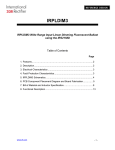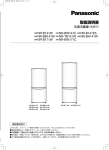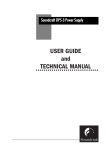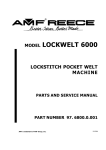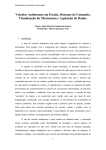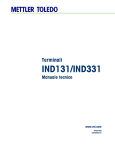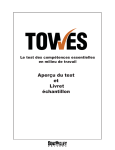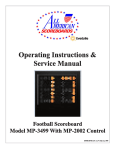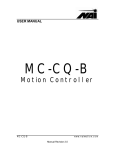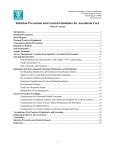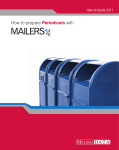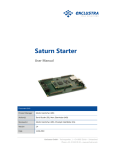Download Tegam RL1-BR1 Operations Manual
Transcript
R1L-BR1 MICROOHM/BOND METER MODEL R1L-BR1 Instruction Manual PN# R1L-BR1-900-01 Publication Date: January 2014 REV. C REPRODUCTION AND DISTRIBUTION OF THIS TECHNICAL MANUAL IS AUTHORIZED FOR US GOVERNMENT PURPOSES. TEGAM PROPRIETARY INFORMATION. NOTE: This User’s Manual was as current as possible when this product was manufactured. However, products are constantly being updated and improved. To ensure you have the latest documentation, refer to www.tegam.com 10 TEGAM WAY • GENEVA, OHIO 44041 • 440-466-6100 • FAX 440-466-6110 • [email protected] TABLE OF CONTENTS TABLE OF CONTENTS 1. INSTRUMENT DESCRIPTION Purpose ............................................................... 1-1 Performance Characteristics ................................... 1-1 Description of Equipment ....................................... 1-2 Figure 1: Front Panel Controls ............................. 1-3 List of Items Furnished .......................................... 1-4 Storage and Shipping Requirements ........................ 1-4 Safety Information and Precautions ......................... 1-4 2. PREPARATION FOR USE AND INSTALLATION Unpacking and Inspection ...................................... 2-1 Preparation for Use................................................ 2-1 3. OPERATING INSTRUCTIONS Pushbutton Functions ............................................ 3-1 General Theory of Operation ................................... 3-2 4. PRINCIPLES OF OPERATION Principles of Operation ........................................... 4-1 5. MAINTENANCE Inspection ............................................................ 5-1 Cleaning .............................................................. 5-1 Calibration ........................................................... 5-2 Troubleshooting .................................................... 5-6 Table 2: Fault Symptoms and Repair Actions ........ 5-6 Preparation for Shipment ....................................... 5-7 Overhaul Instructions ............................................ 5-7 Figure 2: Parts Layout ........................................ 5-8 Figure 3, 4: Digital Section ................................. 5-9 Table 3: Parts List – Main Board Assembly .......... 5-11 Table 4: Parts List – Final Assembly ................... 5-13 Table 5: Parts List – Front Panel Assembly.......... 5-14 Table 6: Parts List – Battery Board Assembly ...... 5-15 Table 7: Vendor Cage Code Directory ................. 5-16 6. SERVICE INFORMATION Preparation for Repair or Calibration Service ............. 6-1 Expedite Repair and Calibration Form ...................... 6-2 Warranty.............................................................. 6-3 10 TEGAM WAY • GENEVA, OHIO 44041 • 440-466-6100 • FAX 440-466-6110 • [email protected] INSTRUMENT DESCRIPTION SECTION 1 INSTRUMENT DESCRIPTION 1.1 Introduction The TEGAM Model R1L-BR1 bond meter is a purpose built, rechargeable battery powered portable instrument for ground bond measurements. The R1L-BR1 comes with push-pin probes and Kelvin alligator clips, all housed within a ruggedized case. It can accurately make measurements with a resolution of 1 µΩ. It has full scale ranges from 2 mΩ to 20 Ω. The resistance reading is displayed on a 3½ digit liquid crystal display on the front panel. An over-range condition is indicated as a "1" followed by three blank digits (the decimal point is also displayed in its normal position for the range selected). 1.2 Performance Characteristics This is a range-selection instrument, with a rotary 5 range selector switch. Range 1 2 3 4 5 Full Scale (Ω) 1.999 m 19.99 m 199.9 m 1.999 19.99 Resolution (Ω) 1µ 10 µ 100 µ 1m 10 m Test Current Peak (A) 1.4 140 m 14 m 1.4 m 140 µ Table 1: Specifications Accuracy: Accuracy on all ranges: ± (0.25% of reading + 1 count), when powered from the batteries only. 10 TEGAM WAY • GENEVA, OHIO 44041 • 440-466-6100 • FAX 440-466-6110 • [email protected] 1-1 INSTRUMENT DESCRIPTION 1.3 Description of Equipment Physical: The circuitry is enclosed in a rugged case. Dimensions: 14.1 in (358 mm) W x 10.6 in (269 mm) D x 6.1 in (155 mm) H. Weight with accessories is 4.45 kg (9.8 lb). Controls and connectors are of a size and spacing such that the instrument may be operated while wearing safety gloves. Electrical: The R1L-BR1 is powered by an internal battery consisting of three rechargeable NiCad ‘C’ cells (2800 mAh 3500 mAh) with a built-in charger. Input power for the charger is 90 VAC to 250 VAC at 50 Hz or 60 Hz. Charging power is supplied via a removable line cord; one end of which plugs into a line filter on the front of the R1L-BR1, and the other end being a standard three-pin grounded line plug. Fuse: ¼ A 3AG Slow blow, TEGAM PN#FU-202 Input Protection: The R1L-BR1 will not be damaged by a signal of 1 Vp-p applied across any pair of input terminals. Environmental: This unit will operate over a temperature range from 0 °C to 50 °C, 75% RH non-condensing, up to 3050 m altitude. Front Panel Controls and Displays (See figure 1) RANGE Switch. The rotary 5 range selector switch may be used to step through all five ranges. POWER Switch. Used to turn the power on or off to the instrument. DISPLAY is a 3 ½ digit, displaying readings from 1.999 to 199.9. Four binding posts for connection of test leads are marked +I, +E, -E, and -I. Proper connections to the resistor under test are described in Section 3.2 below. 10 TEGAM WAY • GENEVA, OHIO 44041 • 440-466-6100 • FAX 440-466-6110 • [email protected] 1-2 INSTRUMENT DESCRIPTION Figure 1: Front Panel Controls 10 TEGAM WAY • GENEVA, OHIO 44041 • 440-466-6100 • FAX 440-466-6110 • [email protected] 1-3 INSTRUMENT DESCRIPTION 1.4 List of Items Furnished 1 each Model R1L-BR1 with power cord 3 each rechargeable NiCad battery cells (P/N: BA-110) 1 each R1L-BR1 Instruction Manual (P/N: R1L-BR1-90001) 2 each Kelvin Clip Cables, one end with a dual banana plug and the other end with a gold plated Kelvin clip (P/N: KTL-100) 2 each Kelvin Probes, one end with a dual banana plug and the other end with a Kelvin Probe with replaceable tips (8 each) (P/N: BCP-10) 1.5 Storage and Shipping Requirements Standard precautions which apply to electronic test instruments should be followed. A hard mechanical shock, such as from dropping the R1L-BR1, could damage the liquid crystal display. Care should be taken to prevent damage to associated cables. Remove the battery cells for inactive storage of 30 days or more. Temperature: -40 °C to +71 °C. Relative humidity: 0 to 100%, non-condensing. Altitude: 4570 m See Section 5.6 below for shipping requirements. 1.6 Safety Information and Precautions ! Grounding the Equipment This product is grounded through the grounding conductor of the power cord. To avoid electrical shock or other potential safety hazards, plug the power cord into a properly wired receptacle before using this instrument. The proper grounding of this instrument is essential for safety and optimizing instrument operation. 10 TEGAM WAY • GENEVA, OHIO 44041 • 440-466-6100 • FAX 440-466-6110 • [email protected] 1-4 INSTRUMENT DESCRIPTION Danger Arising from Loss of Ground If the connection to ground is lost or compromised while charging the batteries, a floating potential could develop in the instrument. Under these conditions all accessible parts, including insulating parts such as knobs and terminals could develop a hazardous voltage and put the user at risk. Use the Proper Fuse To avoid fire hazard, use only the correct fuse type as specified for the AC power supply in the “Description of Equipment” or “Maintenance” sections of this manual. Do Not Use in Explosive Environments The R1L-BR1 microohmmeter is not operation in explosive environments. designed 10 TEGAM WAY • GENEVA, OHIO 44041 • 440-466-6100 • FAX 440-466-6110 • [email protected] 1-5 for PREPARATION FOR USE AND INSTALLATION SECTION 2 PREPARATION FOR USE AND INSTALLATION 2.1 Unpacking and Inspection Upon receipt, the R1L-BR1 and accessories should be carefully unpacked and removed from the shipping container. Separate the units from the packing material and inspect both the instrument and the accessories for any external damage. • If any dents, broken, or loose parts are seen, do not use the equipment, and notify TEGAM immediately. • Check that all items are present. If any items are missing, notify TEGAM immediately. • Note that the instrument is shipped with its battery removed. Unwrap the 3 cells which comprise the battery. 2.2 Preparation for Use Battery Installation Be sure the power line cord is disconnected. Check that the Power Switch is in the OFF position. Remove the ten screws around the R1L-BR1’s top (control/display) panel. Carefully lift the unit out of its cabinet. Place the unit upside down on a surface which will not mar or damage the control/display panel. WARNING DO NOT CONNECT THE AC LINE CORD PRIOR TO REMOVING THE UNIT FROM ITS CASE OR WHILE THE UNIT IS OUT OF ITS CASE, OR ELSE THE MAINS VOLTAGE WILL PRESENT A POSSIBLE SHOCK HAZARD. CAUTION BE SURE TO OBSERVE THE PROPER POLARITY WHEN INSERTING THE BATTERY CELLS OR DAMAGE MAY RESULT. 10 TEGAM WAY • GENEVA, OHIO 44041 • 440-466-6100 • FAX 440-466-6110 • [email protected] 2-1 PREPARATION FOR USE AND INSTALLATION Insert the battery cells, one at a time, in accordance with the polarity indications marked on both the battery cell and the battery holder. Insert the positive end of the battery cells first. After installing the cells, reinstall the instrument in its case and secure the ten screws. Power Up Plug the power cord into the R1L-BR1 front panel receptacle, and plug the other end into a standard AC outlet. For battery operation (with charged battery cells), this step is omitted. Turn on the POWER rotary switch. Note that this switch turns on both line and battery power. Charging the Battery Cells Prior to battery operation, it is recommended the R1L-BR1 Microohm/Bond Meter be plugged into AC power for at least 14 hours to charge the battery cells. To charge the battery cells, the Power Switch must be turned ON, and the Range Switch should be set to 20 Ω. With the Range Switch set to lower ranges, the charge rate decreases and the batteries will be discharged, especially on the 2 mΩ range, even with no resistance connected to the instrument. (However, the discharge rate in this range will permit operation for at least 14 hours with no resistance connected.) WARNING ALTHOUGH THE FRONT PANEL IS NORMALLY GROUNDED VIA THE GROUND PIN OF THE POWER CABLE, IF THIS CONNECTION IS FAULTY AND IF THE HIGH SIDE OF THE POWER CABLE IS SHORTED TO THE PANEL, THE PANEL COULD POSSIBLY HAVE MAINS VOLTAGE ON IT; SO DO NOT TOUCH THE PANEL WHEN AC POWER IS CONNECTED. 10 TEGAM WAY • GENEVA, OHIO 44041 • 440-466-6100 • FAX 440-466-6110 • [email protected] 2-2 OPERATING INSTRUCTIONS SECTION 3 OPERATING INSTRUCTIONS The R1L-BR1 is designed for field or bench-top operation. Use appropriate cables connecting their terminations to the four binding posts marked +I, +E, -E, and -I. WARNING DO NOT TOUCH THE BINDING POSTS WHEN THEY ARE CONNECTED TO EXTERNAL CIRCUITS. LETHAL VOLTAGES MAY BE PRESENT AT THESE POSTS. 3.1 Rotary Switch Functions Operation of the Model R1L-BR1 is simple. There are only two switches. The RANGE rotary switch manually scrolls through the five ranges. Full scale on any range may be described as 2,000 counts (actually 1,999), since this is a 3½ digit meter. If the readings are exceeding 1,999 counts, step to the next higher range. If the readings are less than 2,000 counts, step down a range, so that it will read 1,999 counts, or less. The decimal point is located automatically for the correct reading. If the selected range is too low for the value of the resistor under test, the display will show over-range. The POWER rotary switch turns on the power to operate the unit or turns off the power to the unit. The appearance of the display will show that power is on; absence of the display indicates that either power is off, batteries are discharged, or there is some malfunction. Note that when power is turned off, it may take several seconds to discharge circuit capacity to completely blank the display. The black markings seen have no effect and disappear when power is turned back on. 10 TEGAM WAY • GENEVA, OHIO 44041 • 440-466-6100 • FAX 440-466-6110 • [email protected] 3-1 OPERATING INSTRUCTIONS 3.2 General Theory Of Operation Measurement Principle A 4-terminal measurement method is used to determine the resistance of the item under test. This method allows the accurate measurement of low values of resistance in spite of the other resistances present in the connection leads. A known current is supplied to the item under test via two wire leads connected to the +I and -I binding posts on the R1LBR1 Microohm/Bond Meter front panel. Two other wire leads connected to the +E and -E binding posts on the R1L-BR1 front panel sense the voltage developed across the resistance under test due to the supplied known current. The R1L-BR1 then calculates the resistance of the item under test utilizing Ohm's law, and displays it on a 3 ½ digit display. Kelvin Clip Cable Description A Kelvin clip consists of two opposing jaws of an alligator style clip which are insulated from each other, so one jaw may be used to connect a source of current to the resistance under test, and the other jaw used to measure the voltage at the test point. The two jaws are spring loaded to clamp onto a cylinder of ½ inch diameter or less. WARNING OPERATING THE R1L-BR1 MICROOHM/BOND METER AND TAKING RESISTANCE MEASUREMENTS ON A POWERED OR ENERGIZED COMPONENT COULD CAUSE SERIOUS HARM TO THE OPERATOR AND/OR DAMAGE THE R1L-BR1. BE SURE THE ITEM TO BE MEASURED IS DISCONNECTED FROM OTHER COMPONENTS AND APPARATUS. If the battery cells have not been installed, refer to section 2.2. Battery only operation will result in the most stable and accurate readings. The R1L-BR1 may be operated while charging the batteries, however it will not conform to specifications in this configuration. 10 TEGAM WAY • GENEVA, OHIO 44041 • 440-466-6100 • FAX 440-466-6110 • [email protected] 3-2 OPERATING INSTRUCTIONS NOTE: The amount of current available for charging the battery decreases as lower resistance ranges are selected. In the 2 mΩ range, the current supplied to the resistance under test exceeds the charging current, and the battery will be drained. To obtain the best accuracy, allow the R1L-BR1 to warm up for 15 minutes on the 20 Ω range before making measurements. Even if in battery operation, this will not cause appreciable battery discharge. Using the Kelvin Clip cables Plug one Kelvin Clip cable dual banana plug across the +E and +I binding posts, and plug the other Kelvin Clip cable dual banana plug across the -E and -I binding posts. Note that in both cases, the small "I" marked on the dual banana plug should go into the respective I binding post. If Kelvin Clip cables are not used, a pair of shielded cables may be utilized. As occurs in the Kelvin Clip cables in the above paragraph, one cable should have its shield connected to the “+I” binding post and its center conductor connected to the +E binding post. Similarly, the other cable should have its shield connected to the -I binding post and its center conductor to the -E binding post. It is also recommended that the resistance of the cables should not exceed 350 mΩ/conductor. NOTE: Particularly in the 2 mΩ range, where a test current of approximately 1 . 4 A is used, excessive lead resistance will prevent an accurate measurement. Set the Range Switch to the desired measurement range and read the resistance on the liquid crystal display. If the resistance is higher than the selected range, the display will show a "1" and three blank digits, indicating over-range. The decimal point will also appear in the proper location for the selected range. 10 TEGAM WAY • GENEVA, OHIO 44041 • 440-466-6100 • FAX 440-466-6110 • [email protected] 3-3 OPERATING INSTRUCTIONS After prolonged operation on battery power, when the battery voltage approaches the end of its useful range, the "LO BAT" indicator will be seen on the display. Although the battery cells are not fully discharged and they will not be damaged by additional use, this is a warning to the operator that the battery cells need to be charged. Use of HTP-100 probes with R1L-BR1 1. Connect the BLUE spade lug from the LEFT HTP-100 Probe to the RED E+ terminal of the R1L-BR1. 2. Connect the RED spade lug from the LEFT HTP-100 Probe to the RED I+ terminal of the R1L-BR1. 3. Connect the WHITE spade lug from the RIGHT HTP-100 Probe to the BLACK E- terminal of the R1L-BR1. 4. Connect the BLACK spade lug from the RIGHT HTP-100 Probe to the Black I- terminal of the R1L-BR1. 5. Hold the RED HTP-100 Probe in your left hand and the WHITE HTP-100 Probe in your right hand, and push the probe points against the surface to be measured with sufficient force to cause the points to retract slightly. 10 TEGAM WAY • GENEVA, OHIO 44041 • 440-466-6100 • FAX 440-466-6110 • [email protected] 3-4 PRINCIPLES OF OPERATION SECTION 4 PRINCIPLES OF OPERATION Power Supply The internal switching power supply U8 accepts nominal line voltages between 90 and 250 VAC 50/60 Hz, allowing operation worldwide. C1, C2, U1, R1, R2 and R101 form a constant current regulator set to approximately 758 mA for charging the battery. D5 is used to isolate the AC power for the battery. D7 serves to clamp the voltage to less than 5 V when the battery is disconnected. The negative 3.6 volt power supply for U2 and U10 is developed by U5. Test Current Path The test current used to perform the resistance measurement originates from the battery + terminal connected to the +3.6 V power symbol at the emitter of Q1. It flows through Q1 into the COM1 terminal of SW1 and out of the terminal selected by the switch for the measurement range chosen. Each pole of the COM1 section of SW1 is connected to a different tap on the current sensing resistor string made up of R13, R48, R50, R52 and R54. The test current flows into the sense resistor string at the tap selected, out of R54 into D3 and out of D3 to the I+ test jack. The external test leads conduct the current through the resistance being measured and back to the I- test jack, where it returns to ground and then to the battery terminal. Test Current Regulator The test current is controlled to a constant value for each range with a feedback loop. The main loop amplifier is U9A. The output of U9A controls the conduction of Q1 using Q2, such that if the output voltage of U9A increases, the test current increases. The inputs of U9A compare the voltage across the current sensing resistor string with a 3 volt reference voltage produced by U4, the voltmeter IC. The voltage across the sensing resistor string is maintained at 1.5 V, half the value of the reference voltage because R9 and 10 TEGAM WAY • GENEVA, OHIO 44041 • 440-466-6100 • FAX 440-466-6110 • [email protected] 4-1 PRINCIPLES OF OPERATION R11 are twice the value of R8 and R9. The reference voltage of 3 V is present between the VREF signal at one end of R9 and the +3.6 V power supply present at one end of R11. The voltage at one end of the sensing resistor string is present at U11A pin 1 which feeds R8. The voltage at the other end of the sensing resistor string is present at U11B pin 7 which feeds R10. U11A and U11B are very high input impedance buffer amplifiers which sense the voltage across the current carrying portion of the sensing resistor string without causing errors in the test current. R127, R129 and CR1 provide overvoltage input protection for pin 3 of U11A, and similarly R46, R128 and CR2 for U11B. U2B will shut off the current source if the voltage on the I+ binding post becomes less than about -3 V. Test Current Adjustment The test current on the 2 milliohm range is 1.4 amps. It is very stable, but not adjustable. The 1.4 A current stability is determined by the stability of R54, the 3 V reference developed by U4 and to a minor extent other circuit components. The test currents on the four other ranges are adjusted to approximately 1/10, 1/100, 1/1000 and 1/10000 of the actual value of the 2 milliohm range test current during the calibration/ adjustment process. Trimpots R53, R51, R49 and R114 are used for this adjustment, and are adjusted sequentially in that order. Adjusting the current affects the readings, so current adjustment INDEPENDENT of the readings adjustment is not possible. Voltage Measurement The voltage across the resistance being measured is amplified by U10A, U10B and U9B. The E+ and E- test jacks are the input to this differential amplifier, and the output is connected to the voltmeter IC U4 pins 38 and 39. R130, R131, R141, R142, CR3 and CR4 provide overvoltage input protection. U10A, U10B, R132, R133 and R134 provide a differential gain of 5: the voltage between U10A pin 1 and U10B pin 7 is 5 times the voltage between E- and E+. U9B provides voltage gain of 10, and develops its output between VREF at pin 40 of U4 and VIN+ at pin 39 of U4. An 10 TEGAM WAY • GENEVA, OHIO 44041 • 440-466-6100 • FAX 440-466-6110 • [email protected] 4-2 PRINCIPLES OF OPERATION adjustable bipolar offset voltage is added to this output by R143 before it is applied to VIN- at pin 38 of U4. C18 and 140 are a low pass filter to reduce noise. The voltmeter IC U4 converts the amplified voltage across the resistance being measured into a displayed reading. Because the test current is precisely regulated along with the various gains chosen in the circuit, the displayed value is directly proportional to the resistance being measured. U4 develops a reference voltage of 3 V between pins 8 and 40. The reference is divided by the resistor string R31, R32, R146 and R143. R146 provides an adjustable voltage used as the analog to digital conversion reference to pin 44. R143 provides an adjustable zero reading. Display U4 directly drives the LCD, except for the decimal points and the LOBAT indicator. The decimal point associated with the range selected is displayed when the range switch SW1 provides a +3.6 V signal to one of the inputs of U7. The LOBAT signal is displayed when U2A detects the voltage at pin 40 of U4 falls below ground. Since this pin is maintained by U4 at the reference voltage of 3 V below the battery voltage, LOBAT will be displayed when the battery is less than approximately 3 V. 10 TEGAM WAY • GENEVA, OHIO 44041 • 440-466-6100 • FAX 440-466-6110 • [email protected] 4-3 MAINTENANCE SECTION 5 MAINTENANCE 5.1 Inspection These units should be inspected semi-annually. Cables should be periodically inspected to make sure they are in good condition. Check that the switches turn smoothly. Check all four binding posts to ensure that they operate smoothly. No other maintenance is required, other than to keep the battery charged through power line operation. Charging should be done for at least 14 hours after long periods (several months) of storage or after considerable use on battery power. 5.2 Cleaning The instrument should be cleaned periodically, as is necessary, using mild soap and a damp cloth, followed by a second damp rinsing cloth. Clean the LCD window using a soft cloth moistened with water or "Windex" type window cleaner. DO NOT use common paper towel products as some brands may contain fibers which could scratch the display window. DO NOT apply significant pressure to the LCD window as it could separate from the front panel. DO NOT use alcohol, solvents, or harsh chemicals to clean the LCD window. 5.3 Test Equipment and Tools Required for Calibration and Repair Calibration of the R1L-BR1 is recommended on a yearly basis, and is done at a temperature of 23 °C ± 1 °C. To obtain best results, keep the unit at 23 °C ± 1 °C for at least 8 hours, and allow it to warm up for 30 minutes before making any adjustments. 10 TEGAM WAY • GENEVA, OHIO 44041 • 440-466-6100 • FAX 440-466-6110 • [email protected] 5-1 MAINTENANCE (The calibration procedure and schematics provided in this manual are for the surface mount units manufactured after November 2013. Please contact TEGAM if your instrument is purchased prior to that date.) Precision four terminal resistors with accuracy of 0.05% or better: 1 mΩ, 1.9 mΩ, 19 mΩ, 190 mΩ, 1.9 Ω, and 19 Ω A standard 4 ½ digit digital voltmeter: with 2 V range, accuracy better than 0.03% of reading ±1 count. Screwdrivers: Medium Phillips and small slotted for trim-pot adjustment. Three 20 AWG approximately 4 inch long Bus Wires Four 18 AWG Wires (or dual wire cable) approximately 2 feet long with clips 5.4 Calibration CAUTION SAFETY PRECAUTIONS MUST BE TAKEN WHEN HANDLING THIS INSTRUMENT WHEN THE LINE CORD IS PLUGGED IN AND THE R1L-BR1 HAS BEEN REMOVED FROM ITS CASE, TO ENSURE THAT CONTACT IS NOT MADE WITH THE AC POWER CONNECTIONS OR OTHER POTENTIALLY HARMFUL POINTS. FAILURE TO OBSERVE PROPER SAFETY PRECAUTIONS MAY CAUSE SERIOUS HARM TO THE OPERATOR AND/OR DAMAGE THE R1L-BR1. A. Preparation 1. Remove the front panel assembly from the case by removing the ten retaining screws. Retain the ten screws for reinstallation. 2. Install a new set of approved batteries into the UUT as required. Observe polarity. 3. Plug UUT in and turn on setting the range switch to 20Ω range, allow a 14-hour charge time. (Skip this step if batteries have already been charged.) 4. After the UUT has been charged, unplug the UUT. 5. Allow a 10-minute COOL DOWN. 10 TEGAM WAY • GENEVA, OHIO 44041 • 440-466-6100 • FAX 440-466-6110 • [email protected] 5-2 MAINTENANCE NOTE: Heat from the charging circuit causes the UUT to drift. The COOL DOWN period is only necessary if the UUT has been charging for an extended period of time. 6. Turn the voltmeter on allowing a 10-minute warm up. a) Set unit to measure DC voltage. b) Set unit to Auto range. 7. Connect clip leads to the voltmeter. B. AC Circuitry Check 1. Set the range switch to 20 Ω on the UUT. 2. Connect the voltmeter to the UUT; a) Voltmeter Red test lead to TP1 of the UUT, b) Voltmeter Black test lead to TP2 of the UUT. 3. Plug the UUT into AC and turn on. 4. Verify the reading on the voltmeter reads between 1.0-1.5VDC. 5. Disconnect the UUT from the AC source. 6. Disconnect the Voltmeter from the UUT. NOTE: The UUT is to be unplugged from AC during the remaining portions of the procedure. C. Zero the Display 1. Set the range switch to 2 mΩ on the UUT. 2. Short out all four terminals of the UUT in the following order, +I to –I, –I to +E, +E to –E using the three pieces of buss wire. 3. Adjust R143 for a zero reading ±1 count on the least significant digit as displayed by the UUT. 4. Set the range switch to the next higher range. 5. Verify a zero reading within ±1 count on the least significant digit. 6. Repeat steps 4 and 5 for all remaining ranges. 7. Disconnect the buss wires from the UUT. D. 2 mΩ Adjust (Main Gain Adjust) 1. Set the range switch to 2 mΩ on the UUT. 2. Connect a 1.9 mΩ standard to the UUT using the clip leads. 10 TEGAM WAY • GENEVA, OHIO 44041 • 440-466-6100 • FAX 440-466-6110 • [email protected] 5-3 MAINTENANCE 3. Adjust R32 for a display reading of the actual standards value ±3 counts (±0.003 mΩ) on the display of the UUT, typically 1.900. Allow adequate time for any thermals to dissipate and the unit to settle. 4. Repeat sections C-D until both values are with-in specifications. 5. Disconnect the resistance standard. 6. Connect a 1 mΩ standard to the UUT using the clip leads. 7. Verify that the display of the UUT displays the actual standard value ±2 counts. 8. Disconnect the resistance standard. NOTE: The following adjustment steps build upon each other, and must be performed in sequence. It appears that the connection of standards will be more convenient if the steps are performed in reverse order, from H to E, but this will not provide a satisfactory adjustment, as (for example) the Step E adjustment changes the Step H reading. E. 20 mΩ Adjust 1. Set the range switch to 20 mΩ on the UUT. 2. Connect a 19 mΩ standard to the UUT using the clip leads. 3. Adjust R53 for a display reading of the actual standards value ±3 counts (±0.03 mΩ) on the display of the UUT, typically 19.00. Allow adequate time for any thermals to dissipate and the unit to quit drifting. 4. Disconnect the resistance standard. 5. Connect a 1.9 mΩ standard to the UUT using the clip leads. 6. Verify that the display of the UUT displays the actual standard value ±2 counts. 7. Disconnect the resistance standard. F. 200 mΩ Adjust 1. Set the range switch to 200 mΩ on the UUT. 2. Connect a 190 mΩ standard to the UUT using the clip leads. 10 TEGAM WAY • GENEVA, OHIO 44041 • 440-466-6100 • FAX 440-466-6110 • [email protected] 5-4 MAINTENANCE 3. Adjust R51 for a display reading of the actual standards value ±3 counts (±0.3 mΩ) on the display of the UUT, typically 190.0. Allow adequate time for any thermals to dissipate and the unit to quit drifting. 4. Disconnect the resistance standard. 5. Connect a 19 mΩ standard to the UUT using the clip leads. 6. Verify that the display of the UUT displays the actual standard value ±2 counts. 7. Disconnect the resistance standard. G. 2 Ω Adjust 1. Set the range switch to 2 Ω on the UUT. 2. Connect a 1.9 Ω standard to the UUT using the clip leads. 3. Adjust R49 for a display reading of the actual standards value ±3 counts (±0.003 Ω) on the display of the UUT, typically 1.900. Allow adequate time for any thermals to dissipate and the unit to quit drifting. 4. Disconnect the resistance standard. 5. Connect a 190 mΩ standard to the UUT using the clip leads. 6. Verify that the display of the UUT displays the actual standard value ±2 counts. 7. Disconnect the resistance standard. H. 20 Ω Adjust 1. Set the range switch to 20 Ω on the UUT. 2. Connect a 19 Ω standard to the UUT using the clip leads. 3. Adjust R114 for a display reading of the actual standards value ±3 counts (±0.03 Ω) on the display of the UUT, typically 19.00. Allow adequate time for any thermals to dissipate and the unit to quit drifting. 4. Disconnect the resistance standard. 5. Connect a 1.9 Ω standard to the UUT using the clip leads. 6. Verify that the display of the UUT displays the actual standard value ±2 counts. 7. Disconnect the resistance standard. 10 TEGAM WAY • GENEVA, OHIO 44041 • 440-466-6100 • FAX 440-466-6110 • [email protected] 5-5 MAINTENANCE 5.5 Troubleshooting Following are possible symptoms, diagnosis, and repair suggestions for use in trouble-shooting (the most likely causes are listed first). Symptom No Display Faulty Component Batteries Power cord Power switch U6 Check for batteries installed & polarity. Check the power cord is plugged in. Check the power switch is ON. Check for a square wave between pin 4 & 40 of U4, if present, replace U6. Connections Remove battery cells and bend contact arms inward to ensure better contact with the battery cells. Clean connections if required. Try a new set of batteries. Check fuses. Check for 12 VDC across C1. If not check for mains on pins 1 & 2 of U8. If not replace U8. If ok, check for aprox. 6 VDC (ref. to common) at the output of U1. If not, replace U1. If above ok, check for approximately 4.5 VDC (ref. to common) at the anode of D5, if not, replace R1/R101. If above ok, check for approximately 3.6 VDC (ref. to common) at the cathode of D5, if not, replace D5. Batteries Fuse Fuse (F1) Battery won’t charge U1 R1/R101 D5 Display reads zero with cables connected to a good resistor Repair Current o/p Kelvin Clip U9/U11/Q1 U10/U9 Check for proper current o/p between +I and -I. If above ok, check the Kelvin cable for continuity from each side to the banana plug. If no current, troubleshoot the const. current circuit and replace U11 or other component(s) if defective. If the current and cables are both ok, check the voltage amplifier and replace U10,U9 or other component(s) if defective. Table 2: Fault Symptoms and Repair Actions After trouble-shooting and repair, the instrument must be recalibrated in accordance with 5.4 above. 10 TEGAM WAY • GENEVA, OHIO 44041 • 440-466-6100 • FAX 440-466-6110 • [email protected] 5-6 MAINTENANCE Disassembly • First remove the line cord and any other connecting wires. Then remove the ten screws of the top (display) panel. Carefully lift the unit out of its cabinet. Remove the three battery cells. • Remove the four screws that secure the battery plate. • Loosen the set screws in the knobs for the Power and Range switches, and remove these knobs. • To separate the printed circuit board from the front panel, remove the two screws and two standoffs appearing in a rectangular pattern around the LCD and control switches. Remove the four nuts from the binding post connections. Re-assembly To reassemble the unit, repeat the above steps in reverse order, taking care to install the lockwashers on the proper screws. 5.6 Preparation for Shipment The original shipping carton is not reusable. Remove the battery cells prior to shipment (or inactive storage of 30 days or more) and package them separately. Disassemble the R1L-BR1 as per section 5.5, and extract the negative end of the battery cells first. Packaging must provide sufficient resilient material, in accordance with standard packaging practices, to prevent excessive shock to the power supply and display during shipment. 5.7 Overhaul Instructions The R1L-BR1 is an all solid-state unit and requires no periodic overhaul, other than routine cleaning, inspection of cables per section 5, and calibration per section 5.4. 10 TEGAM WAY • GENEVA, OHIO 44041 • 440-466-6100 • FAX 440-466-6110 • [email protected] 5-7 MAINTENANCE However, some disassembly is required to remove and install the batteries. This level of disassembly is detailed in section 2.2 and battery cells should be removed at the negative end first. Tools and test equipment used for disassembly, calibration, and troubleshooting of the R1L-BR1 are listed in section 5.3. Troubleshooting suggestions are given in section 5.5. The only component expected to require replacement is the battery. The battery designation is listed on the Replacement Parts List, with battery cell removal and installation instructions given in section 2.2. Figure 2: Parts Layout 10 TEGAM WAY • GENEVA, OHIO 44041 • 440-466-6100 • FAX 440-466-6110 • [email protected] 5-8 MAINTENANCE Figure 3: Digital Section 10 TEGAM WAY • GENEVA, OHIO 44041 • 440-466-6100 • FAX 440-466-6110 • [email protected] 5-9 MAINTENANCE Figure 4: Digital Section 10 TEGAM WAY • GENEVA, OHIO 44041 • 440-466-6100 • FAX 440-466-6110 • [email protected] 5-10 MAINTENANCE Part Number: R1L-B-100 Item Part Qty Reference Value Description Manufacturer P/N CAP ALUM 220uF 35V F EEE-1VA221UP 1 1 C1 220uF 2 6 0.1uF 3 4 4 1 C2 C3 C4 C9 C21 C26 C10 C11 C12 C13 C18 5 1 C22 6 1 C23 7 1 C24 8 1 C25 9 1 C27 10 1 C28 11 4 12 4 13 1 C30 C33 CR1 CR4 D3 14 1 D5 ES1B 15 1 D7 5.6V 16 1 D9 17 1 U6 18 1 F1 19 1 J2 20 1 J3 22 1 Q2 23 2 R1 R101 3.3 24 1 R2 100 25 5 R3 R4 R34 R35 R36 10.0K RES THICK FILM 1% 1/8W 0805 26 1 R5 1.00K RES THICK FILM 1% 1/8W 0805 27 1 R6 4.99 28 5 R7 R128 R129 499 R141 R142 RES THICK FILM 1% 1/8W 0805 RES THICK FILM 1% 1/8W 0805 CAP CER 50V X7R 0805 C0805C104K5R ACTU 6.8uF CAP TANT 16V 10% TR3A685K016C EIAA 3000 1.0uF CAP FILM(PEN) 1.0uF ECWU1105KCV 100V 1.0uF CAP CER 50V X7R 0805 GRM21BR71H1 05KA12L 0.1uF CAP FILM(PEN) 0.1uF ECWU1104JC9 100V 2416 0.47uF CAP FILM(PEN) 0.47uF ECWU1C474JC9 16V 2416 0.1uF CAP FILM(PP) 0.1uF ECWF2104JAQ 250V RAD_10MM 4.7uF CAP TANT 16V EIAA TR3A475K016C 1500 10000pF CAP CER 250VAC DE2F3KH103MA RAD_7.5MM 3B C31 C32 0.1uF CAP CER 0.1UF 50V X7R C1206C104K5R 1206 AC CR2 CR3 BAV23S DIO FAST DUAL 200V BAV23S-7-F 400mA SOT-23-3 SS24 DIO SCHOTTKY 40V 2A SS24T3G SMB DIO FAST 100V 1A SMA ES1B-13-F DIO ZENER 5.6V 1W DFLZ5V6 POWERDI123 1.5 AMP DIO GP 400V 1.5A SMB MRS1504T3G LCD DISP 3.5 DIG 0.5”H 35D050-T3PBZ IC 2A FUSE 2A 125VAC/DC 2410 39-29- CONN HEADER RIGHT 102 ANGLE 2X1 4.2MM 640456- CONN HEADER 3 VERTICAL 1x3 2.54MM FMB222 XSISTOR BJT NPN DUAL 2A 40V 500mA TSOT-23-6 RES CARBON FILM 5% 1W MELF 0207 RES THICK FILM 1% 1/8W 0805 CB61F2A 39-29-102 640456-3 Manufacturer TEGAM P/N PANASONIC C-328-220UF KEMET C-610-0.1UF VISHAY C-606-6.8UF PANASONIC C-335-1.0UF MURATA C-0805K1.0UF C-630-0.1UF PANASONIC PANASONIC PANASONIC C-6320.47uF C-514-0.1UF VISHAY C-606-4.7UF MURATA C-59510000PF 150036 KEMET DIODES INCORPORATED ON SEMICONDUCT OR DIODES INCORPORATED DIODES INCORPORATED ON SEMICONDUCT OR FEMA ELECTRONICS CORP COOPER BUSSMANN MOLEX TE CONNECTIVITY FMB2222A FAIRCHILD SEMICONDUCT OR CMB02070X330 VISHAY8JB200 BEYSCHLAG ERJ-6ENF1000V PANASONIC RC0805FRYAGEO 07100RL ERJ-6ENF1002V PANASONIC RC0805FRYAGEO 0710KL ERJ-6ENF1001V PANASONIC RC0805FRYAGEO 071KL RC0805FRYAGEO 074R99L ERJ-6ENF4990V PANASONIC DZ-228 DZ-157 DZ-172 DZ-180 DZ-130 DD-130 FU-25 CS-22 CS-199 TG-270 R-250-3.3 R-618-100 R-618-10K R-618-1K R-618-4.99 R-618-499 10 TEGAM WAY • GENEVA, OHIO 44041 • 440-466-6100 • FAX 440-466-6110 • [email protected] 5-11 MAINTENANCE Item Part Reference R8 R10 R134 R135 R136 R147 R157 R162 R9 R11 R132 R133 R13 Value Description 15.0K RES THICK FILM 0.1% 1/8W 0805 31.6K RES THICK FILM 0.1% 1/8W 0805 RES THICK FILM 0.1% 1/8W 0805 150K 2 R31 R137 R138 R32 R53 34 1 R33 174K 35 2 R43 R44 499K 36 2 R45 R47 18.0K 37 4 1.00K 38 1 R46 R127 R130 R131 R48 39 1 R49 10K 40 1 R50 100 41 2 R51 R143 1K 42 1 R52 43 1 44 1 45 Qty Manufacturer P/N ERA-6AEB153V Manufacturer TEGAM P/N PANASONIC R-638-15K PANASONIC R-638-31.6K PANASONIC TT ELEC./IRC R-638-10K PANASONIC R-638-150K BOURNS RP-103-500 PANASONIC YAGEO R-618-174K PANASONIC R-638-499K PANASONIC R-638-18K PANASONIC R-515-1K SUSUMU R-550-1.0K BOURNS VISHAY RP-10310.0K R-169-100 BOURNS RP-103-1.0K 10.0 RES THICK FILM 0.1% 1/8W 0805 RES TRIMMER 1/4W 12- 3224G-1-501E TURN 4mm SQ SMD RES THICK FILM 1% ERJ-6ENF1743V 1/8W 0805 RC0805FR07174KL RES THICK FILM 0.1% ERA1/8W 0805 6AEB4993V RES THICK FILM 0.1% ERA-6AEB183V 1/8W 0805 RES THICK FILM 1% ERJ-8ENF1001V 1/4W 1206 RES THICK FILM 0.1% RG3216P-10011/4W 1206 B-T1 RES TRIMMER 1/4W 12- 3224G-1-103E TURN 4mm SQ SMD RES METAL FILM 0.1% CMF55100R00B 1/2W AX EEB RES TRIMMER 1/4W 12- 3224G-1-102E TURN 4mm SQ SMD RES WW 1% 3W AX 43F10RE OHMITE R-275-10 R54 1.00 RES WW 1% 5W AX OHMITE R-341-1 R114 100K BOURNS 1 R115 13.0K PANASONIC RP-103100.0K R-515-13K 46 1 R121 110K PANASONIC R-515-110K 47 1 R125 154 PANASONIC R-515-154 48 1 R126 1.30K PANASONIC R-515-1.3K 49 4 150 PANASONIC R-638-150 50 1 R139 R145 R158 R159 R140 PANASONIC R-515-49.9K 51 1 R144 0.0 PANASONIC YAGEO R-618-0 52 1 R146 3.57K PANASONIC SUSUMU R-638-3.57K 53 1 R150 140 PANASONIC R-515-140 54 1 R151 1.96K PANASONIC R-515-1.96K 55 1 R152 19.6K PANASONIC R-515-19.6K 56 1 R153 196K RES TRIMMER 1/4W 12- 3224G-1-104E TURN 4mm SQ SMD RES THICK FILM 1% ERJ-8ENF1302V 1/4W 1206 RES THICK FILM 1% ERJ-8ENF1103V 1/4W 1206 RES THICK FILM 1% ERJ-8ENF1540V 1/4W 1206 RES THICK FILM 1% ERJ-8ENF1301V 1/4W 1206 RES THICK FILM 0.1% ERA-6AEB151V 1/8W 0805 RES THICK FILM 1% ERJ-8ENF4992V 1/4W 1206 RES THICK FILM JUMPER ERJ-6GEY0R00V 1/8W 0805 RC0805JR070RL RES THICK FILM 0.1% ERA1/8W 0805 6AEB3571V RG2012P-3571B-T5 RES THICK FILM 1% ERJ-8ENF1400V 1/4W 1206 RES THICK FILM 1% ERJ-8ENF1961V 1/4W 1206 RES THICK FILM 1% ERJ-8ENF1962V 1/4W 1206 RES THICK FILM 1% ERJ-8ENF1963V 1/4W 1206 PANASONIC R-515-196K 29 8 30 4 31 1 32 3 33 10.0K 500 1.00K 49.9K ERA6AEB3162V ERA-6AEB103V PFC-W0805LF03-1002-B1739 ERA-6AEB154V 45F1R0E 10 TEGAM WAY • GENEVA, OHIO 44041 • 440-466-6100 • FAX 440-466-6110 • [email protected] 5-12 MAINTENANCE Item Description 2 Part Reference R154, R156 Value 57 2.0M 58 2 SO6 SO60 SIP-20 59 2 SW1 SW2 2P6T RES THICK FILM 1% 1/8W 0805 CONN SIL-SOCKET 0.472" STANDOFF HEIGHT 20-POS SW ROTARY DP 6-POS 60 2 TP1 TP2 61 1 U10 62 2 U11 U9 63 1 U2 64 1 U4 S175146R OPA218 0 OPA237 6 LMC648 2 MAX138 65 1 U5 66 1 U6 67 1 U7 68 1 U8 Qty Manufacturer Manufacturer P/N ERJ-6ENF2004V PANASONIC 316-93-120-41- MILL-MAX 008000 C5P0206N-R TP LOOP SMD S1751-46R IC OPAMP DUAL ZERO- OPA2180IDR DRIFT SOIC-8 IC OPAMP DUAL LOW OPA2376AID NOISE SOIC-8 IC OPAMP DUAL CMOS LMC6482IM/NO SOIC-8 PB IC 3.5 DIGIT ADC MAX138CMH W/LCD DRIVER QFP-44 7660 IC REGULATOR ICL7660ACBAZ SWITCHED CAP SOIC-8 A 3.5DIGI DISPLAY 3.5 DIGIT W/ ± 35D050-T3PBZ T LCD AND LOBAT IND., USE W/ BACKLIGHT 4070B IC QUAD 2-INPUT XOR CD4070BM96 SOIC-14 VOF-15- PS 12VDC 1.25A OPEN VOF-15-12 12 FRAME PCB MOUNT TEGAM P/N R-618-2.0M SO-314-20 ELECTROSWITC SW-419 H HARWIN INC. CS-122 TEXAS INSTRUMENTS TEXAS INSTRUMENTS TEXAS INSTRUMENTS MAXIM IC-352 INTERSIL IC-809 FEMA ELEC. DD-130 TEXAS INSTRUMENTS CUI INC IC-863 IC-358 IC-251 IC-241 PS-128 Table 3: Parts List – Main Board Assembly Part Number Part Description BA-110 BATT,C,NICAD,3000mAh Qty 3 UM EA Manufacturer PANASONIC Cage Code 0HF77 Mfg Part P-280CR SANYO 00JU0 N-3000CR TENERGY 55R99 20400 49374 R1L-BR1-040 FRONT PANEL ASSY 1 EA TEGAM, INC KAK-1M CBL, KELVIN-BANANA, R1L-BR1 1 EA SILVERTRONIC 129609 BCP-10 KELV PRB, SPRING LOAD PINS 1 EA C PETROVIC BCP-10 BCP-10-A PIN SET, 8 PINS, A STYLE 1 EA CO-115 LINECORD 1 EA VOLEX U7112 17250-10-B1 PK-5000 POCKT POUCH R1L-BR1 0TJ49 PK-5000 1 EA ELLIS CH R1L-BR1-900-01 OPERATION MANUAL 1 EA R1L-B/BR-841 CD MANUAL MILITARY AR EA ACTIVITIES PRESS TEGAM, INC MC-1212 R1L-BR1 LABEL 1 EA 1531 CASE, R1LC-080 1 EA 5879 TBG, N16 VINYL FBGL, GRN AR FT DOC-019 PRODUCT SPEC SHEET TEMP REF EA NUTRON NAMEPLATE AMERIPACK 49374 30236 0TJ49 R1L-B-90001 MC-1212 1013 Table 4: Parts List – R1L-BR1 Final Assembly 10 TEGAM WAY • GENEVA, OHIO 44041 • 440-466-6100 • FAX 440-466-6110 • [email protected] 5-13 MAINTENANCE Part Number: R1L-BR1-040 Cage Code Mfg Part 5D6S9 3750-0 Part Number Part Description Ref BP-50-0 BIND POST CON GLD-PLT BP -I, BLK BP -E Qty UM Manufacturer 2 EA POMONA ELECTRONICS BP-50-2 BIND POST CON GLD-PLT BP +I, RED BP +E 2 EA POMONA ELECTRONICS 5D6S9 3750-2 CS-104 CON,DUL,BINDPOST,BASE BP +I, BLK +E,-I,-E PWR ENTRY LINEFILTER LF1 3A 2 EA 5D6S9 3862 1 EA POMONA ELECTRONICS CORCOM 1Z830 6609000-4 FUSE HLD PNL MNT 6.3X32MM FUSE,1/4A 3AG SLOW BLOW XF1 2 EA TYCO\TE CONNECTIVITY LITTELFUSE F1 2 EA LITTELFUSE 7E222 313.25 LITTELFUSE 7E222 313.250HXP 2 EA BERGQUIST 55285 3223-07FR-90 BERGQUIST THERMALLOY 55285 SP400-0.00700-90 13103 7721-7PPS THERMALLOY 13103 7721-7PPSG TEGAM, INC 49374 210117800 ITW PANCON 0K1B5 CE100F22-3-D 91833 908 PE-2 FH-20 FU-202 IN-7 SIL-PAD,HEATPAD TO 220 WA-20 WSH,NYLON #4 Q1,U1 2 EA 38AS8 3EEA1 7E222 03453LF1H 210108 LUG,SOLDER,#4 1 EA 12373 DISPLAY GASKET R1L-B 2 EA KEYSTONE ELECTRONICS GASKO ST-318 STNDOF,8-32X1/2"HEX BRS Z WSH,#8 LOCK,GLD PLATED NUT,HEX,8-32,GLD PLATED SCR PH 4-40 X 1/4 LG 4 EA MCMASTER-CARR 0KVE6 92700A452 4 EA MPT FASTENER 4 EA MPT FASTENER 6 EA MPT FASTENER 2 EA MPT FASTENER 45T10 BUY WIT NUT8/32 & WA-242 45T10 BUY WITH WA242 & WA-244 45T10 NON MIL EQUAL BY DESC 45T10 6 EA BEAVER BOLT OB6M9 3538 MPT FASTENER 45T10 4-40 HEX NUT 18-8 45T10 NON MIL EQUAL BY DESC 71002 8518/19 GRN WA-244 NUT-8/32GLD MS51957-13 4SCW,PFH,4/40X1/2,SS,BL 40X1/2PFHBLK K 3538 NUT,HEX,4-40 MS35338-135 WSH LOCK #4 11 EA MPT FASTENER 6168 WIRE,N18 STR GRN TFLN AR FT BIRNBACH KN-106 CS-21 CS-105 ST-335 6R887 12373 BELDEN WIRE AND CABLE TEGAM, INC 3HXC8 83029 005100 TEGAM, INC 49374 600005 49374 079-145-5 KNOB,ROUND,KNURLED.6 .4MM CONN,PUSH ON 2 EA MULTICOMP/SPC 75498 MC21051 1 EA MOLEX KB925 39012020 CONN,TERM,FEMLE,18-24 AWG STANDOFF,4-40X3/4 HEX 2 EA MOLEX KB925 39-00-0039 4 EA MCMASTER-CARR 0KVE6 91780A745 10 TEGAM WAY • GENEVA, OHIO 44041 • 440-466-6100 • FAX 440-466-6110 • [email protected] 5-14 MAINTENANCE Part Number Part Description 015-317 IC VOLT REG ADJ TG-34 Ref Qty 1 XISTOR,BIPOLAR,PNP TX-20-3/16 1 TUBING SHRINK 3/16 MS35338-137 AR WSH LOCK,SPLT,#8 4 UM EA EA EA EA Manufacturer FAIRCHILD SEMICONDUCTOR NATIONAL SEMICONDUCTOR MOTOROLA Cage Code Mfg Part 4E8P4 LM317T LM317T TIP34 ST MICROELECTROINC S TEGAM, INC SCE76 TIP34C TEGAM, INC 49374 600008 ALPHA WIRE & CABLE ALLIED WIRE & CABLE TEGAM, INC 92194 FIT221 3/16 TEGAM, INC 49374 50626 TEGAM, INC 49374 NAS1676C8 MPT FASTENER 45T10 NON MIL EQUAL BY DESC 5JH28 R1LBR1-319 92194 HST221-3/16 49374 6196 R1LBR1-319 FRONT PANEL 1 EA R1LBR1-320 FRONT PNLW/ OVERLAY REF EA R1LBR1-321 1 EA R1L-B-100 FRONT PNL OVERLAY R1LBR1 PC ASSY, R1L-B 1 EA R1L-BR1-700 FIXTURE FRNT PNL REF EA DD-130 LCD DISP 3.5 DIGIT 0.5”H IC SWITCH ROTARY 2 POLE 2 POS 1 EA 2 EA SO-314-20 SOCKET ROW 20 PIN SIP 2 EA 999920-000 WIR,20 AWG TFE BLACK AR EA 999920-008 WIR,20 AWG TFE GREY AR EA ST-317 STNDOF,4-40X.25 M/F STEEL PC ASSY R1L-B BATT BRD 4 EA BELDEN WIRE AND CABLE BELDEN WIRE AND CABLE MCMASTER-CARR 1 EA TEGAM, INC 49374 LOCTITE,263,HI STG,THRD AR EA LOCTITE 05972 263 SW-419 R1L-B-200 LOCTITE263 AMERICAN METAL SPECIALTIE 49374 079-148-8 NUTRON NAMEPLATE TEGAM, INC 30236 PER PRINT FEMA ELECTRONICS CORP ELECTROSWITCH TEGAM, INC TEGAM, INC MILL-MAX OP7Z6 35D050-T3PBZ 49374 C5P0206N-4006 49374 SW-420 49374 SW-421 3N087 316-93-120-41008-000 3HXC8 83007-010 3HXC8 83007-008 0KVE6 93620A430 Table 5: Parts List – R1L-BR1 Front Panel Assembly Part Number: R1L-B-200 Part Number R1L-B-172 BH-107 EY-35 Part Description PCB BATTERY BRD R1L-B BATT HOLDER END "C" INSUL EYELET 3/32X0.156 Qty 1 UM EA Manufacturer ALPHA CIRCUITS 6 EA 12 EA KEYSTONE ELECTRONICS KEYSTONE ELECTRONICS Cage Code 33TM7 Mfg Part R1L-B-172 91833 87 91833 35 10 TEGAM WAY • GENEVA, OHIO 44041 • 440-466-6100 • FAX 440-466-6110 • [email protected] 5-15 MAINTENANCE Part Number BH-25 CS-211-3 999924000 999924002 999924003 TX-20-3/16 ST-420 Part Description BATT HOLDER KEY INSUL CONN,3 PIN,IDC INLINE Qty 3 UM EA 1 EA WIR,24 AWG,TEFLON BLK WIR,24 AWG,RED,TEFLON WIR,24 AWG,TFE,ORANGE TUBING SHRINK 3/16 AR IN AR IN AR IN AR EA SPA, INS PCB, NYL,.250X.260 2 EA Cage Code 91833 Mfg Part 59 0K1B5 CE100F22-3-C ITW PANCON 0K1B5 CE100F22-3-D BELDEN WIRE AND CABLE BELDEN WIRE AND CABLE BELDEN WIRE AND CABLE ALPHA WIRE & CABLE 3HXC8 83003-10/BLK 3HXC8 83003-2(RED) 3HXC8 92194 830033(ORNG) FIT221 3/16 ALLIED WIRE & CABLE 92194 HST221-3/16 TEGAM, INC 49374 6196 KEYSTONE ELECTRONICS 91833 9029 Manufacturer KEYSTONE ELECTRONICS ITW PANCON Table 6: Parts List –Battery Board Assembly Manufacturer Cage Code 91967 92194 OTJ49 16299 3HXC8 F0978 63HW9 ABBATRON HH SMITH ALPHA AMERIPACK AVX BELDEN BOURNS C&K COMMERCIAL-SEE MCMASTER CARR CONCORD 18310 COOPER BUSSMANN 1UW16 CORCOM 38AS8 CUSTOM COIL 0VYL0 DIALIGHT (DIALCO) 96312 DISCH-SEE TEGAM EAGLE 0MPC5 ELECTROSWITCH 8T045 ELECTRO-TECH SYSTEMS 56541 ETCHED METAL-SEE TEGAM FAIRCHILD SEMICONDUCTOR 4E8P4 FEMA OP7Z6 GE (MG CHEMICALS) L3160 GRAYHILL 81073 HARWIN INC. 06EX9 ILLINOIS CAPACITOR 74840 INTERSIL CORPORATION K0331 KEMET ELECTRONICS 31433 KOA 59124 LITTLEFUSE 7E222 Manufacturer MAXIM MCMASTER CARR MICRO COMMERCIAL MILL MAX MOLEX MOTOROLA MPT FASTENER MULTICOMP MULTI-CONTACT MURATA ELECTRONICS NA NATIONAL SEMICONDUCTOR OHMITE OLDAKER ON SEMICONDUCTOR PANASONIC PHILIPS POMONA PPM-SEE TEGAM SPRAGUE SUSUMU ST MICROELECTRONICS TEGAM, INC TEXAS INSTRUMENTS TYCO TYTON VISHAY VOLEX POWER CORDS Cage Code 1ES66 OKVE6 374W0 3N087 KB925 0G546 45T10 75498 0WCJ0 3EH09 0G557 03615 64882 59PE1 0HF77 0TBA7 5D6S9 5079 SAW40 SCE76 49374 8T904 Z9V34 3E655 56845 U7112 Table 7: Vendor Cage Code Directory 10 TEGAM WAY • GENEVA, OHIO 44041 • 440-466-6100 • FAX 440-466-6110 • [email protected] 5-16 SERVICE INFORMATION SECTION 6 SERVICE INFORMATION Preparation for Calibration or Repair Service Once you have verified that the cause for R1L-BR1 malfunction cannot be solved in the field and the need for repair and calibration service arises, contact TEGAM customer service to obtain an RMA, (Returned Material Authorization), number. You can contact TEGAM customer service via the TEGAM website, www.tegam.com or by calling 440.466.6100 (All Locations) OR 800.666.1010 (United States Only). The RMA number is unique to your instrument and will help us identify you instrument and to address the particular service request by you which is assigned to that RMA number. Of even importance, a detailed written description of the problem should be attached to the instrument. Many times repair turnaround is unnecessarily delayed due to a lack of repair instructions or of a detailed description of the problem. This description should include information such as measurement range, and other instrument settings, type of components being tested, are the symptoms intermittent?, conditions that may cause the symptoms, has anything changed since the last time the instrument was used?, etc. Any detailed information provided to our technicians will assist them in identifying and correcting the problem in the quickest possible manner. Use a copy of the Repair and Calibration Service form provided on the next page. Once this information is prepared and sent with the instrument to our service department, we will do our part in making sure that you receive the best possible customer service and turnaround time possible. 10 TEGAM WAY • GENEVA, OHIO 44041 • 440-466-6100 • FAX 440-466-6110 • [email protected] 6-1 SERVICE INFORMATION Expedite Repair & Calibration Form Use this form to provide additional repair information and service instructions. The Completion of this form and including it with your instrument will expedite the processing and repair process. RMA#: Instrument Model #: Company: Phone Number: Serial Number: Technical Contact: Additional Contact Info: Repair Instructions: Evaluation Repair & Calibration Calibration Only Z540 Repair Only Detailed Symptoms: Include information such as measurement range, instrument settings, type of components being tested, is the problem intermittent? When is the problem most frequent?, has anything changed with the application since the last time the instrument was used?, etc. 10 TEGAM WAY • GENEVA, OHIO 44041 • 440-466-6100 • FAX 440-466-6110 • [email protected] 6-2 SERVICE INFORMATION Warranty TEGAM, Inc. warrants this product to be free from defects in material and workmanship for a period of one year from the date of shipment. During this warranty period, if a product proves to be defective, TEGAM Inc., at its option, will either repair the defective product without charge for parts and labor, or exchange any product that proves to be defective. TEGAM, Inc. warrants the calibration of this product for a period of one year from date of shipment. During this period, TEGAM, Inc. will recalibrate any product, which does not conform to the published accuracy specifications. In order to exercise this warranty, TEGAM, Inc., must be notified of the defective product before the expiration of the warranty period. The customer shall be responsible for packaging and shipping the product to the designated TEGAM service center with shipping charges prepaid. TEGAM Inc. shall pay for the return of the product to the customer if the shipment is to a location within the country in which the TEGAM service center is located. The customer shall be responsible for paying all shipping, duties, taxes, and additional costs if the product is transported to any other locations. Repaired products are warranted for the remaining balance of the original warranty, or 90 days, whichever period is longer. 10 TEGAM WAY • GENEVA, OHIO 44041 • 440-466-6100 • FAX 440-466-6110 • [email protected] 6-3 SERVICE INFORMATION Warranty Limitations The TEGAM, Inc. warranty does not apply to defects resulting from unauthorized modification or misuse of the product or any part. This warranty does not apply to fuses, batteries, or damage to the instrument caused by battery leakage. The foregoing warranty of TEGAM is in lieu of all other warranties, expressed or implied. TEGAM specifically disclaims any implied warranties of merchantability or fitness for a particular purpose. In no event will TEGAM be liable for special or consequential damages. Purchaser’s sole and exclusive remedy in the event any item fails to comply with the foregoing express warranty of TEGAM shall be to return the item to TEGAM; shipping charges prepaid and at the option of TEGAM obtain a replacement item or a refund of the purchase price. Statement of Calibration This instrument has been inspected and tested in accordance with specifications published by TEGAM Inc. The accuracy and calibration of this instrument are traceable to the National Institute of Standards and Technology through equipment, which is calibrated at planned intervals by comparison to certified standards maintained in the laboratories of TEGAM Inc. Contact Information TEGAM INC. 10, TEGAM WAY GENEVA, OHIO 44041 CAGE Code: 49374 WEB: http://www.tegam.com 10 TEGAM WAY • GENEVA, OHIO 44041 • 440-466-6100 • FAX 440-466-6110 • [email protected] 6-4





































